The Everest Base Camp Trek is a remarkable 12-day journey that takes trekkers through the stunning Himalayan landscape. Ascending from lush forests to high-altitude villages, this challenge culminates in the once-in-a-lifetime opportunity to witness the majestic Mount Everest at the final destination of Everest Base Camp. Explorers will be greeted by awe-inspiring high-altitude environments, rugged mountain terrain, and the unique Sherpa culture and traditions. While this trek offers a culture experience, the moderate fitness requirements make it accessible to a range of travelers. From the accommodations to the meals, this journey promises an unforgettable adventure for those seeking to push their boundaries.
Key Points
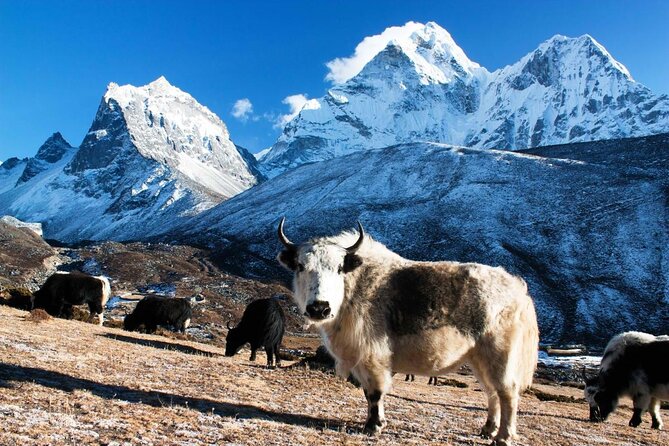
- Experience a remarkable journey through stunning Himalayan landscapes, ascending from lush forests to high-altitude villages.
- Witness the awe-inspiring Mount Everest and reach the iconic Everest Base Camp at 5,364 meters.
- Explore the rugged mountain terrain, sparse vegetation, and unique Sherpa culture and traditions.
- Enjoy a diverse culinary experience and immerse in the teahouse accommodation for a cultural exchange.
- Requires a moderate fitness level for the challenging high-altitude trek, with necessary inclusions and exclusions.
Trekking to Everest Base Camp
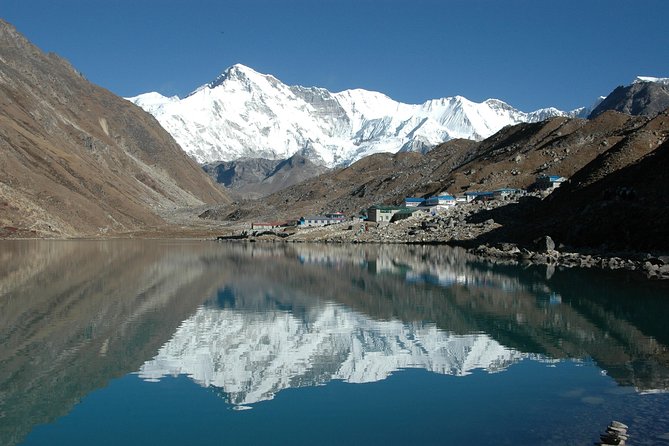
The Everest Base Camp trek takes adventurous travelers on a remarkable journey through the stunning Himalayan landscape, offering a once-in-a-lifetime opportunity to witness the grandeur of the world’s highest mountain.
The 12-day trek follows ancient trade routes, ascends through lush forests, and climbs to high-altitude villages where you’ll learn about the local Sherpa culture.
As you trek higher, the views become more breathtaking, with snow-capped peaks and glaciers coming into view.
The final destination, Everest Base Camp, sits at an elevation of 5,364 meters (17,598 feet), providing a humbling perspective of the colossal Mount Everest towering above.
This challenging yet rewarding trek is suitable for moderately fit travelers with previous hiking experience.
Ready to hit more trails? More hiking adventures we feature in Kathmandu
Exploring High-Altitude Landscapes
As trekkers ascend through the Himalayan landscape, they’re greeted with awe-inspiring high-altitude environments that challenge the senses and push the boundaries of human endurance. Rugged mountain terrain, sparse vegetation, and thinner air create a stark, otherworldly atmosphere that demands respect and careful navigation.
Breathtaking vistas of snow-capped peaks, glaciers, and towering ridges that seem to touch the sky.
Encounters with hardy wildlife adapted to the harsh conditions, like the elusive Himalayan blue sheep and the majestic Himalayan griffon vulture.
Opportunities to immerse in the unique culture and traditions of the Sherpa people, who’ve thrived in these remote, high-altitude regions for centuries.
Discovering Sherpa Culture
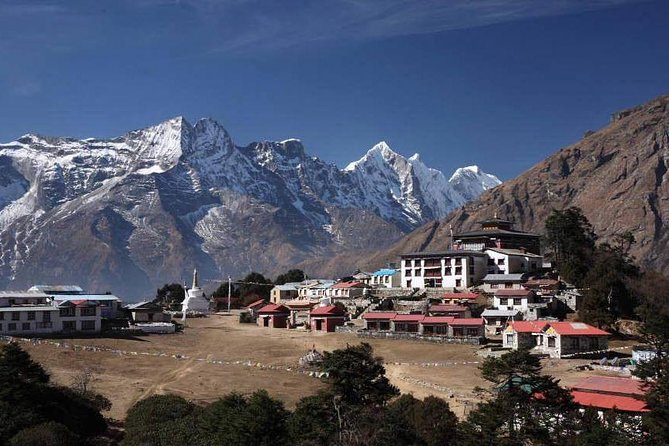
Alongside the dramatic landscapes, trekkers on the Everest Base Camp journey gain invaluable insights into the vibrant Sherpa culture that has adapted and thrived in these high-altitude realms for generations.
The Sherpas, known for their mountaineering prowess and warm hospitality, welcome visitors to their quaint villages, monasteries, and community gatherings. Trekkers can observe the Sherpas’ daily life, from their reverence for the mountains to their intricate Buddhist traditions.
Engaging with local Sherpas provides a unique opportunity to understand their resilience, their deep connection to the land, and their integral role in supporting the Everest expeditions. This cultural exchange enriches the trekking experience, fostering a greater appreciation for the people who call this extraordinary region home.
Moderate Fitness Requirements
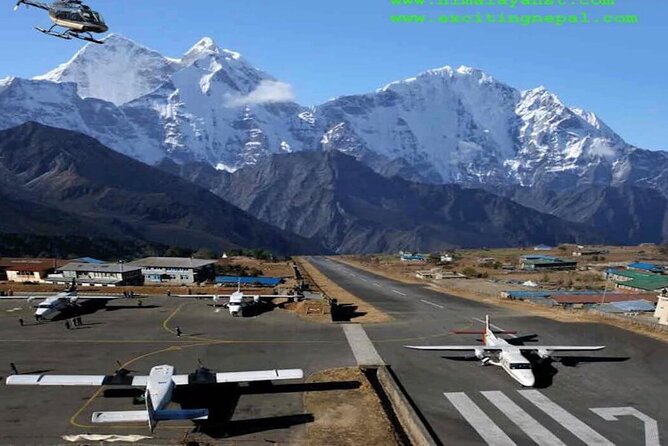
Trekkers embarking on the Everest Base Camp journey must possess a moderate level of physical fitness to successfully navigate the challenging terrain and high-altitude environment.
This trek isn’t recommended for those with limited hiking experience or underlying health conditions.
While the pace is generally slow and allows for acclimation, trekkers should be able to:
- Hike for 5-7 hours per day, covering distances of 6-10 km
- Traverse steep, uneven trails with frequent ascents and descents
- Cope with the effects of high altitude, including fatigue, shortness of breath, and headaches
With the right preparation and mindset, the Everest Base Camp trek can be an incredibly rewarding experience for moderately fit travelers.
Trek Accommodations and Meals
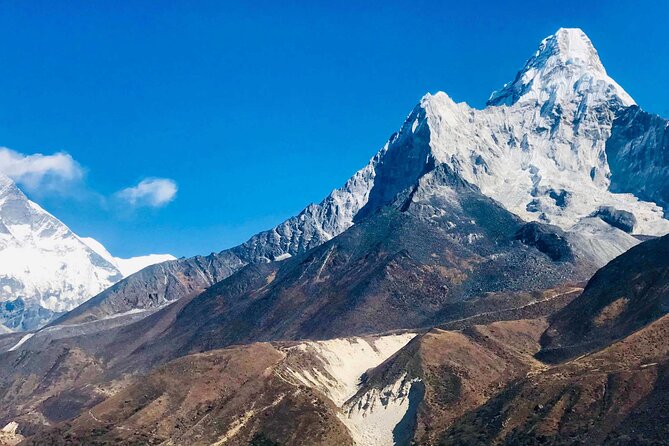
Accommodations during the Everest Base Camp trek are provided in teahouses, which are basic but comfortable lodges along the trekking route. These teahouses offer shared dormitory-style rooms and shared bathroom facilities, providing a unique culture for trekkers.
Meals are included during the trek, with 11 dinners, 12 breakfasts, and 11 lunches provided. The meals feature a mix of local Nepali dishes and Western-style options, ensuring trekkers can enjoy a diverse culinary experience. The included meals are served at the teahouses or at local restaurants, allowing trekkers to sample the flavors of the Khumbu region.
- Everest Base Camp Helicopter Tour Stop at Everest View Hotel
- Private Kathmandu Sightseeing Tour – UNESCO World Heritage Sites
- Everest Base Camp Helicopter Tour Landing at Hotel Everest View
- 14-Day Private Annapurna Base Camp Trek
- Everest Base Camp Trek-12 Days
- 200 Hours Yoga Teacher Training at Nepal Yoga Home (Starts on 1st of Everymonth)
Included and Excluded Services
The Everest Base Camp trek package includes a range of essential services to support trekkers throughout their journey. This covers accommodations during the trek, national park fees, flights to and from the starting point in Lukla, as well as trekking equipment like sleeping bags and down jackets.
Plus, arrival and departure transfers are provided, along with a total of 11 dinners, 12 breakfasts, and 11 lunches.
However, the package excludes:
- Personal expenses such as alcoholic or cold drinks, and laundry
- Porter service, if required
- Travel insurance and medical expenses
These additional costs will need to be factored in by trekkers to ensure a seamless and enjoyable Everest Base Camp experience.
Pickup and Transfer Details
The trek package includes pickup from the Kathmandu Valley, ensuring a hassle-free start to the Everest Base Camp adventure. Travelers will be met at their hotel or the airport and transferred to the starting point of the trek. This convenient service eliminates the need to navigate public transportation or arrange individual transfers, allowing participants to focus on the exciting journey ahead.
The return transfer at the end of the trek is also included, so travelers can relax and enjoy the scenic drive back to Kathmandu after their challenging and rewarding experience.
With these seamless pickup and transfer arrangements, the Everest Base Camp trek becomes an effortless and worry-free experience from start to finish.
Group Size and Accessibility
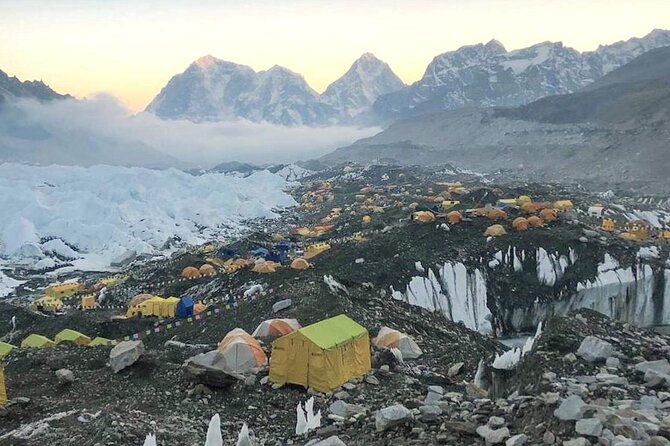
A maximum group size of 26 travelers ensures an intimate and personalized trekking experience on the Everest Base Camp adventure.
However, this trek isn’t wheelchair accessible and is also not recommended for travelers with back problems or those who are pregnant, as the high-altitude terrain and challenging hiking conditions require a moderate level of physical fitness.
The trek involves long days of hiking at high altitudes, which can be physically demanding.
Travelers must be able to walk for several hours at a time, often on uneven and rocky terrain.
Good cardiovascular fitness and previous hiking experience are essential for the successful completion of this trek.
Frequently Asked Questions
What Is the Best Time of Year to Do the Everest Base Camp Trek?
The best time for the Everest Base Camp trek is typically during the spring (March-May) or autumn (September-November) seasons. These periods offer clear skies, mild temperatures, and ideal trekking conditions, making them the most popular and recommended times to undertake this remarkable journey.
Can I Bring My Own Trekking Gear or Is It Provided?
The Everest Base Camp trek provides trekking equipment like sleeping bags and down jackets, but you can also bring your own gear if you prefer. Travelers should have moderate physical fitness and be prepared for the high-altitude conditions.
Is There an Option to Hire a Porter During the Trek?
Yes, porters can be hired during the trek. The trek package includes an option to rent porter services if required. Travelers can hire porters to carry their personal belongings, providing a more comfortable trekking experience.
Are There Any Vaccination Requirements for This Trek?
There are no specific vaccination requirements for the Everest Base Camp Trek. However, travelers should ensure they’re up-to-date on routine vaccinations and consider getting vaccinated for hepatitis A and typhoid, which are recommended for travel to Nepal.
Can I Extend or Shorten the 12-Day Itinerary if Needed?
Yes, the itinerary can be extended or shortened to accommodate travelers’ needs and fitness levels. The tour operator can customize the trek duration based on individual preferences and abilities within reasonable limits.
Recap
The Everest Base Camp Trek offers a remarkable opportunity to take in the stunning Himalayan landscape and Sherpa culture.
Trekkers will ascend through lush forests to high-altitude villages, culminating in the once-in-a-lifetime experience of witnessing Mount Everest at the final destination.
The challenge is suitable for moderately fit travelers with hiking experience, who’ll enjoy the trek’s accommodations, meals, and included services.
More Hiking & Trekking Tours in Kathmandu
More Tour Reviews in Kathmandu
Not for you? Here's more things to do in Kathmandu we have recnetly reviewed
- 2 Best Guided Tours In Jagat
- 20 Best 2 Day Tours In Kathmandu
- 20 Best 3 Day Tours In Kathmandu
- 20 Best 4 Day Tours In Kathmandu
- 8 Best Dining Experiences In Kathmandu
- 20 Best Full-Day Tours In Kathmandu
- 25 Best Helicopter Flights And Tours In Kathmandu
- 25 Best Helicopter Flights And Tours In Kathmandu
- 13 Best Massage And Relaxation Services In Kathmandu
- 5 Best Photography Experiences In Kathmandu
- 8 Best Dinner Tours In Kathmandu
- 17 Best Lunch Experiences In Kathmandu
